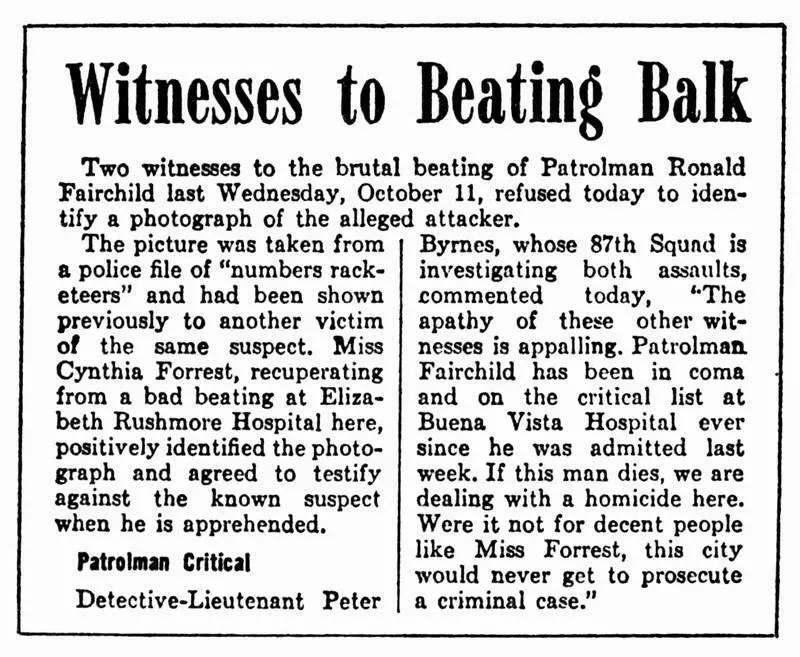“They call him Cookie.”
“Cookie what?”
“I don’t know his last name. Just Cookie. He comes to collect for the numbers.”
“Do you sell peanuts, Mr. Krepps?”
“What? Peanuts?”
“Yes.”
“No, I don’t sell peanuts. I carry some chocolates and some Life Savers and some chewing gum, but no peanuts. Why? You like peanuts?”
“Is there anyplace on the dock where I can get some?”
“Not on the dock,” Krepps said.
“Where then?”
“Up the street. There’s a bar. You can get peanuts there.”
“Thank you,” Kling said. “You’ve been very helpful.”
“Good, I’m glad,” Krepps said. “Now, please, would you mind paying for the coffee you drank?”
The front plate-glass window of the bar was painted a dull green. Bold white letters spelled out the name, BUDDY’S, arranged in a somewhat sloppy semicircle in the center of the glass. Kling walked into the bar and directly to the phone booth some five feet beyond the single entrance door. He took a dime from his pocket, put it in the slot, and dialed his own home phone. While the phone rang unanswered on the other end, he simulated a lively conversation and simultaneously cased the bar. He did not recognize Cindy’s attacker among any of the men sitting at the bar itself or in the booths. He hung up, fished his dime from the return chute, and walked up to the bar. The bartender looked at him curiously. He was either a college kid who had wandered into the waterfront area by accident—or else he was a cop. Kling settled the speculation at once by producing his shield.
“Detective Bert Kling,” he said. “87th Squad.”
The bartender studied the shield with an unwavering eye—he was used to bulls wandering in and out of his fine establishment—and then asked in a very polite, prep-school voice, “What is it that you wish, Detective Kling?”
Kling did not answer at once. Instead, he scooped a handful of peanuts from the bowl on the bar top, put several into his mouth, and began chewing noisily. The proper thing to do, he supposed, was to inquire about some violation or other, garbage cans left outside, serving alcohol to minors, any damn thing to throw the bartender off base. The next thing to do was have the lieutenant assign another man or men to a stakeout of the bar, and simply pick up Cookie the next time he wandered in. That was the proper procedure, and Kling debated using it as he munched on his peanuts and stared silently at the bartender. The only trouble with picking up Cookie, of course, was that Cindy Forrest had been frightened half to death by him. How could you persuade a girl who’d been beaten senseless that it was in her own interest to identify the man who had attacked her? Kling kept munching his peanuts. The bartender kept watching him.
“Would you like a beer or something, Detective Kling?” he asked.
“You the owner?”
“I’m Buddy. You want a beer?”
“Uh-uh,” Kling said, chewing. “On duty.”
“Well, was there something on your mind?” Buddy asked.
Kling nodded. He had made his decision. He began baiting his trap. “Cookie been in today?”
“Cookie who?”
“You get a lot of people named Cookie in here?”
“I don’t get anybody named Cookie in here,” Buddy said.
“Yeah, you do,” Kling said, and nodded. He scooped up another handful of peanuts. “Don’t you know him?”
“No.”
“That’s a shame.” Kling began munching peanuts again. Buddy continued watching him. “You’re sure you don’t know him?”
“Never heard of him.”
“That’s too bad,” Kling said. “We want him. We want him real bad.”
“What for?”
“He beat up a girl.”
“Yeah?”
“Yeah. Sent her to the hospital.”
“No kidding?”
“That’s right,” Kling said. “We’ve been searching the whole damn city for him.” He paused, and then took a wild gamble. “Couldn’t find him at the address we had in the Lousy File, but we happen to know he comes in here a lot.”
“How do you happen to know that?”
Kling smiled. “We’ve got ways.”
“Mmm,” Buddy said noncommittally.
“We’ll get him,” Kling said, and again he took a wild gamble. “The girl identified his picture. Soon as we pick him up, good-bye, Charlie.”
“He’s got a record, huh?”
“No,” Kling answered. “No record.”
Buddy leaned forward slightly, ready to pounce. “No record, huh?”
“Nope.”
“Then how’d you get his picture for the girl to identify?” Buddy said, and suddenly smiled.
“He’s in the numbers racket,” Kling said. Idly, he popped another peanut into his mouth.
“So?”
“We’ve got a file on them.”
“On who?”
“On half the guys involved with numbers in this city.”
“Yeah?” Buddy said. His eyes had narrowed to a squint. It was plain to see that he did not trust Kling and was searching for a flaw in what he was being told.
“Sure,” Kling said. “Addresses, pictures, even prints on some of them.”
“Yeah?” Buddy said again.
“Yeah.”
“What for?”
“Waiting for them to step out of line.”
“What do you mean?”
“I mean something bigger than numbers. Something we can lock them up for and throw away the key.”
“Oh.” Buddy nodded. He was convinced. This, he understood. The devious ways of cops, he understood. Kling tried to keep his face blank. He picked up another handful of peanuts.
“Cookie’s finally stepped over the line. Once we get him, the girl takes another look, and bingo! First-degree assault.”
“He used a weapon?”
“Nope, his hands. But he tried to kill her nonetheless.”
Buddy shrugged.
“We’ll get him, all right,” Kling said. “We know who he is, so it’s just a matter of time.”
“Yeah, well.” Buddy shrugged.
“All we have to do is find him, that’s all. The rest is easy.”
“Yeah, well, sometimes finding a person can be extremely difficult,” Buddy said, reactivating his prep-school voice.
“I’m going to give you a word of warning, friend,” Kling said.
“What’s that?”
“Keep your mouth shut about my being in here.”
“Who would I tell?”
“I don’t know who you’d tell, but it better be nobody .”
“Why would I want to obstruct justice?” Buddy said, an offended look coming onto his face. “If this Cookie person beat up a girl, why then good luck to you in finding him.”
“I appreciate your sentiments.”
“Sure.” Buddy paused, and glanced down at the peanut bowl. “You going to eat all of those, or what?”
“Remember what I told you,” Kling said, hoping he wasn’t overdoing it. “Keep your mouth shut. If this leaks, and we trace it back to you…”
“Nothing leaks around here but the beer tap,” Buddy answered, and moved away when someone at the other end of the bar signaled him. Kling sat a moment longer, and then rose, put another handful of peanuts into his mouth, and walked out.
On the pavement outside, he permitted himself a smile.
The item appeared in both afternoon newspapers later that day.
It was small and hardly noticeable, buried as it was in a morass of print on the fourth page of both papers. Its headline was brief but eye-catching:

Byrnes read the article in the privacy of his corner office, and then looked up at Kling, who was standing on the other side of his desk, beaming with the pride of authorship.
“Is Fairchild really on the critical list?” he asked.
Читать дальше


![Корнелл Вулрич - Eyes That Watch You [= The Case of the Talking Eyes]](/books/32103/kornell-vulrich-eyes-that-watch-you-the-case-of-thumb.webp)










